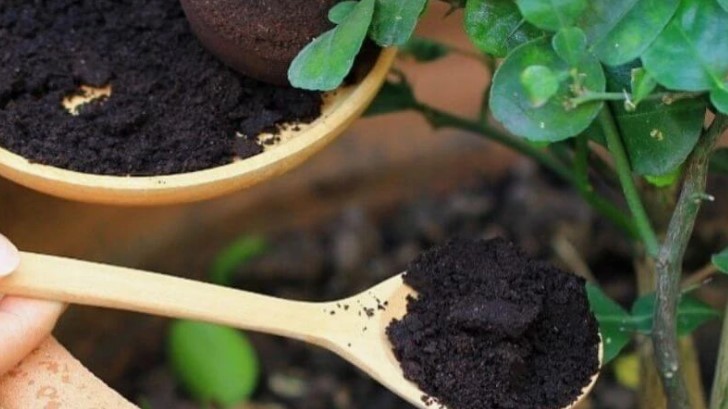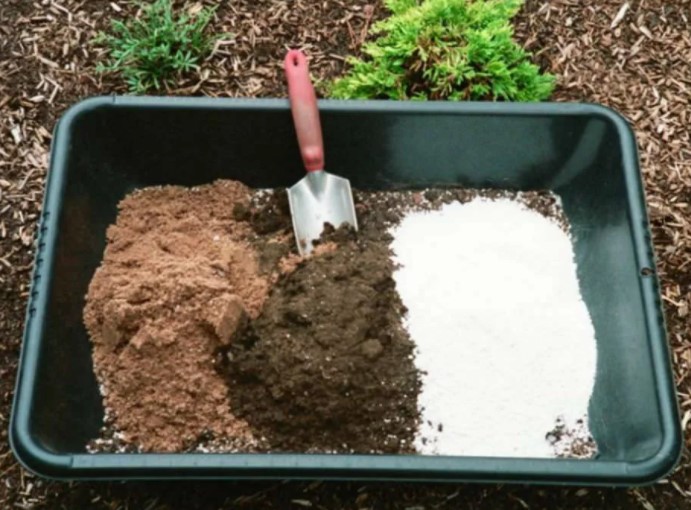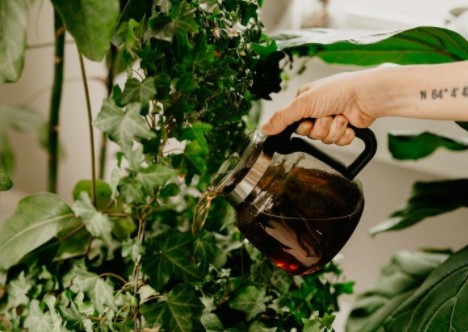Table of Contents
Yes, coffee grounds do help houseplants. Like us humans, plants also like to take up energy and nourishment from coffee. So, if you wonder if you are the only one who craves a cup of joe, then this article will be a fun ride for you.
As a coffee lover, I know how much it breaks your heart to throw away used coffee grounds. But there are so many ways you can utilize used coffee grounds (anchor “Can you reuse coffee grounds for a cold brew”).

And don’t worry if you do not consume coffee that much. A coffee house nearby will be happy to give you a good amount of used coffee grounds for free.
So why do people use coffee grounds? Well, hold your breath tight as I am going to tell you how you can help your houseplants grow and shine by using coffee grounds.
The Hidden Goodness in Used Coffee Grounds
We know all about the flavors and aromas that coffee grounds give to our coffee. But the lesser-known fact is that the coffee grounds left after the brewing process has so much goodness left.
While that leftover is not of any use to us, our houseplants can gain a lot from it. So how exactly do coffee grounds help houseplants grow? Well, the answer to this question is simple. Coffee grounds have the following components:
- Nitrogen: It is needed by every plant to prepare food from sunlight. Used coffee grounds have around 2% nitrogen which is one of the most important nutrients for keeping a plant alive.
- Phosphorus & Potassium: Plants require phosphorus and potassium for energy production.
- Micronutrients: Other micronutrients like copper, zinc, calcium, and magnesium are also part of coffee grounds.
How To Use Coffee Grounds on Your Houseplants?
Using coffee grounds on houseplants is a bit tricky. There is some effort behind houseplants that look happy and healthy. A little of your care and attention can make your houseplants mesmerizing.
So here I am telling you the methods of how coffee grounds help houseplants grow. These are very simple procedures that can increase the lifespan of your houseplants.
Compost
The most effective way to use coffee grounds for houseplants is by incorporating them into compost. It is the most useful way to provide nutrition to the houseplants using house waste.

Compost is a mixture of greens, browns, and water. The browns are leaves, twigs, and paper. You can also use your coffee filters as a brown component for your compost. The green part of the compost is where you can use coffee grounds to enrich your houseplants. Apart from coffee grounds, greens can also contain vegetable waste and fruit scraps.
The greens provide nitrogen and the browns provide carbon. Take greens and browns into a 3:1 ratio, add some water, and let them sit in a bucket for some days. This will allow the complex products to break down into micro nutrients.
You may also see the growth of worms in the compost. But nothing to worry about as worms are known as farmers’ best friends. They turn the soil into a digestible form for the plants.
Once your compost is ready, transfer it to the layer beneath the topsoil. Make this mixture and forget about buying chemical fertilizers. The fungi and bacteria in the compost will provide all the nutrition to the houseplants.
Have a look at: The 13 Best Espresso Machines Under 700 | Reviews 2025
Mulch
Most people like to mix coffee grounds directly with the soil. But I like to mix it into the mulch mixture. This provides the houseplants with all the essential nutrients without causing any harm from their caffeine content. So what does mulch do?

Mulch is rich in organic materials. You can use decaying leaves, wood chips, and even eggshells as mulch. They provide insulation to the houseplants, trapping all the nutrients inside and keeping the pests and insects away. So do coffee grounds help indoor plants such as mulch?
Adding coffee grounds to the mulching mixture has superb effects on the houseplants. While you may think that mulching indoor plants is not necessary, it is.
If you want to see your plants blooming, then add those brewed coffee grounds to your mulch.
Fertilizer Or Potting Mix
There are some situations where using coffee grounds can have bad effects on a plant. One of them is using coffee grounds directly. So rather mix it with the soil in some proportion and then see the magic.

Now in what quantity should you add the coffee grounds to the soil depends upon two requirements of your plants:
1. Acidity
2. Water
Some houseplants require an acidic medium for growth. This means that the soil should have a pH of 0 to 6.9 with 0 being highly acidic. Fresh coffee grounds are more acidic. While used coffee grounds are more toward a neutral site on the pH scale.
Some indoor plants that require an acidic medium are Blueberry plants, Gardenias, African violets, Abutilons, and much more.
Next are the water requirements of the plants. Coffee grounds hold up water. So avoid using coffee grounds if you have cacti or succulents.
One tip that I can give you here is to mix some amount of coffee grounds with soil. The coffee grounds retain water and the soil makes a way for drainage. This tip is best for plants that need water.
Watering
You can use the leftover brewed coffee mix for watering plants. But make sure to dilute the mixture a bit before pouring it into the soil.

Usually, It depends on the plant. Plants that prefer more acidic soil seem to respond well to weekly watering with coffee. Acid-loving plants such as azaleas, lupines, and pines or shrubs thrive outdoors if watered regularly with cold coffee.
Benefits Of Using Coffee Grounds For Houseplants
Coffee grounds help houseplants grow and nourish to their fullest. They provide the exact nutrients that plants need to sustain a healthy life.
Here are some benefits that you get when you use coffee grounds as a food supplement for your houseplants.
Fungal Growth
Fungal growth is always something alarming for humans but this is not the case with plants. Coffee grounds are a substrate for the growth of fungi and also bacteria.
These microorganisms turn the soil into organic matter. The complex soil particles are broken down into simpler molecules that are absorbed by the roots. This organic matter is good for your plants as it helps them be green, leafy, and thriving.
You may take an interest in this: The 8 Best Cheap K Cup Coffee Makers in 2025 – Buying Guide
Water Retention
As I discussed above also, coffee grounds are hydrophilic. This means that they tend to hold water. This is great for plants that need water in excess amounts to grow.
Coffee grounds are a great way to keep your houseplants hydrated in hot weather. When coffee grounds are used as a mulch they trap the moisture in the soil. This prevents your plants from dehydrating.
Pesticide
Coffee grounds are an amazing pesticide. They keep snails and slugs away from your indoor plants. So in this way, you can save some extra bucks from spending on pesticides.
Reduce Your Carbon Footprint
Saving Mother Earth should be one of our priorities. By reusing coffee grounds you are saving something that will otherwise be added to the garbage. So this is your contribution towards preventing environmental pollution.
Final Thoughts
So are coffee grounds good for houseplants? Yes, of course, they are. Coffee grounds can entirely change your planting experience.
What I love most about this is that you don’t have to spend on buying expensive chemical fertilizers and pesticides. This also adds to your contribution to the environment by not throwing away coffee grounds.
So if you want to see your houseplants grow and live then start saving those coffee grounds. Be creative and experiment with as many ideas as you can.






